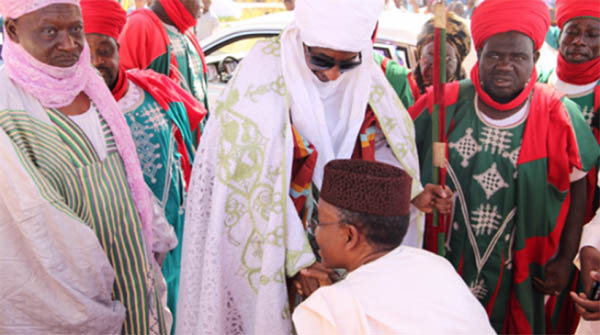Muhammadu Sanusi II, the outspoken and erudite Emir of Kano, finds himself back on the throne after a controversial dethronement in 2020. This reinstatement marks a significant turn of events, not just for the Kano Emirate but for Nigerian politics as a whole. Let’s delve deeper into the life and legacy of this captivating figure.
Below are seven things you should know about the reinstated Emir of Kano, Muhammadu Sanusi II.
A Fearless Voice
Sanusi’s outspoken nature predates his ascension to the throne. He has consistently addressed national issues, particularly economic and political ones. Even as a traditional ruler, he didn’t shy away from criticizing leaders, accusing them of neglecting the North and contributing to the widening north-south wealth gap.
Dynasty and Dethronement
Sanusi’s lineage is steeped in royalty. His grandfather, Muhammadu Sanusi I, was also Emir, but was dethroned for similar reasons – challenging the status quo. This history seems to repeat itself, with Sanusi II facing removal in 2020, allegedly for insubordination.
From Banking Guru to Scholarly Monarch
Sanusi’s journey began not in the palace, but in the world of finance. A brilliant scholar, he rose through the ranks of the banking industry, eventually becoming CEO of First Bank, a financial giant in Africa. His academic credentials are equally impressive, with degrees in economics and a history of lecturing at Ahmadu Bello University. This blend of financial expertise and intellectual prowess made him a natural choice for Governor of the Central Bank of Nigeria in 2009.
A Modern Reformer with a Whistle
Sanusi’s tenure at the Central Bank was marked by a drive for reform. He instituted measures to strengthen banks, promote financial stability, and ensure fairer practices. He even exposed alleged corruption within the powerful Nigerian National Petroleum Corporation (NNPC), leading to a public battle that ultimately resulted in his suspension. While some controversies surrounded his own tenure, his willingness to be a whistleblower garnered respect.
A Controversial Rise
Sanusi’s ascension to the throne in 2014 wasn’t without its critics. Some questioned his motives, suggesting he sought the position to evade potential fraud charges related to his central bank tenure. Others argued for a different heir. Despite these controversies, Sanusi was crowned, becoming not just Emir, but also the leader of the Tijaniyya Sufi order, a significant position within Nigerian Islam.
A Dissident for Progress
Sanusi’s reign as Emir was marked by progressive pronouncements. He advocated for ending child marriage, prioritizing education over mosque construction, and focusing on infrastructure development. He also called for population control and challenged the traditional practice of polygamy, which he saw as exacerbating poverty. These stances earned him the label of a dissident within some conservative circles, but also solidified his image as a reformer.
The return of Sanusi II to the Kano Emirate is a story with national implications. His outspoken nature, intellectual prowess, and commitment to progress make him a unique figure in Nigerian politics. As he resumes his role, it will be interesting to see how he navigates the complex political landscape and continues to advocate for a more prosperous and equitable future.













